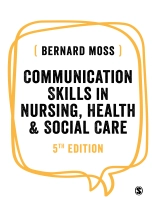Our ability to communicate is a key part of everyday life and is an essential skill, particularly when communicating with vulnerable people in a health and social care setting.
Presented in a unique and easy-to-use dictionary format, this practical guide will help students and practitioners understand and apply the principles of effective communication. From the ‘how to’ practicalities through to challenges and honing existing skills, this book will ensure they have the confidence and knowledge to communicate skilfully and successfully in many different contexts and settings.
The new edition features:
Essential reading for anyone working in the helping professions for whom good communication skills are an essential part of their role.
Mục lục
Acceptance
Active Listening
Advising
Advocacy
Anti-discriminatory Practice
Assertiveness
Assessment
Barriers to Good Communication
Breaking Bad News
Chairing Meetings
Challenging
Complaints
Confidentiality
Conflict Management
Counselling
Court Room Skills
Documentation, Recording and Form Filling
Ecomaps
Emotional Intelligence (EI)
Empathy
Empowerment, Resilience and a Strengths Perspective
Endings
Establishing a Professional Relationship
Feedback: Giving and Receiving
Genograms
Getting Unstuck
Group Work
Information & Communication Technology (ICT) and Health Informatics
Interpreters
Interprofessional Collaboration
Interviewing Children
Labyrinths
Learning Difficulties
Loss
Mediation Skills
Mindfulness
Motivational Interviewing
Non-verbal Communication
Overcoming Fears and Anxieties
Professional Capabilities Framework (PCF)
Reflective Practice
Religion
Simulation
Social Media
Spirituality
Suicide
Supervision
Talks and Presentations
Telephone, Skyping and Video Conferencing Skills
Time Management
Tricky Topics: Sexuality and Death
Whistle Blowing
Wrong Messages
Giới thiệu về tác giả
Bernard Moss was Emeritus Professor of Social Work Education and Spirituality at Staffordshire University. He was responsible for teaching communication skills to social work students for over a decade. His highly interactive and experiential approach to teaching gave students an opportunity to take responsibility for their own learning and development as trainee practitioners. His teaching excellence was recognised by the Higher Education Academy UK, who in 2004 awarded him a National Teaching Fellowship, in 2007 a Senior Fellowship, and in 2013 Principal Fellowship status. He was part of the working group established by the Social Care Institute for Excellence to prepare a report on the literature on communication skills for social work, and also produced a DVD on the use of large-group role play in higher education. He was one of only three UK university teachers to be invited to contribute a chapter to the prestigious international publication Inspiring Academics: Learning with the World’s Great University Teachers, published in 2011 by the Open University Press. He published widely on the theme of spirituality, for which he was awarded a Ph D by Staffordshire University in 2011. His book on Spirituality and Social Work, co-authored with Professor Margaret Holloway in 2010, has been widely acclaimed. In 2016 he co-authored with Dr Jan Sellers an international book on the use of labyrinths in Higher Education ( Learning with the Labyrinth: Creating Reflective Space in Higher Education. Palgrave) and the contribution that labyrinth walks can make to enrich the learning and teaching process for students and staff, as well as enhancing their general well-being.












